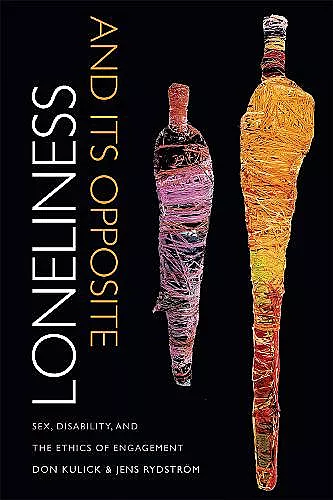Loneliness and Its Opposite
Sex, Disability, and the Ethics of Engagement
Don Kulick author Jens Rydström author
Format:Paperback
Publisher:Duke University Press
Published:13th Mar '15
Should be back in stock very soon

Few people these days would oppose making the public realm of space, social services and jobs accessible to women and men with disabilities. But what about access to the private realm of desire and sexuality? How can one also facilitate access to that, in ways that respect the integrity of disabled adults, and also of those people who work with and care for them?
Loneliness and Its Opposite documents how two countries generally imagined to be progressive engage with these questions in very different ways. Denmark and Sweden are both liberal welfare states, but they diverge dramatically when it comes to sexuality and disability. In Denmark, the erotic lives of people with disabilities are acknowledged and facilitated. In Sweden, they are denied and blocked. Why do these differences exist, and how do both facilitation and hindrance play out in practice?
Loneliness and Its Opposite charts complex boundaries between private and public, love and sex, work and intimacy, and affection and abuse. It shows how providing disabled adults with access to sexual lives is not just crucial for a life with dignity. It is an issue of fundamental social justice with far reaching consequences for everyone.
“Complex but important to disability studies programs. … Recommended. Graduate students, faculty, professionals." -- J. L. Croissant * Choice *
“This is a powerful book, sure to make the reader sit up, both intellectually and emotionally, as it considers a subject still largely hidden from investigative scrutiny because of ignorance, anxiety, prejudice and false moralities…. Loneliness and its Opposite will make highly rewarding reading for academically oriented insiders and various feminist, queer, disability and welfare state theorists.” -- E. Stina Lyon * Times Higher Education *
"Kulick and Rydström make important and timely contributions to several disciplines, including disability studies, social work and gender studies. Loneliness and Its Opposite is a must-read for those who work with and care for people with disabilities and it should also be of great interest to disability and gender studies scholars. Readers will be impressed by the breadth of historical detail and will be challenged to further consider the materiality of disability. . . ." -- Margaret Campbell * Social Anthropology *
"Loneliness and its Opposite is an important contribution to the ongoing work of advancing the sexual lives of disabled people, particularly in its empirical findings that show how life changing politically progressive policy frameworks can be for disabled lives when they are both well funded and when there exists a strong commitment to facilitating those policies in practice." -- Kelly Fritsch * Feminist Review *
"Thought provoking, intentionally humorous at many times, and possessing a rare clarity in argument, this book should be broadly assigned, read, and debated in both undergraduate and graduate seminars." -- Karen Nakamura * Medical Anthropology Quarterly *
"As a medical anthropologist interested in chronicity and impairment, I’m more than a little in love with Loneliness and Its Opposite. It makes me attempt to take a more inclusive and daring approach, both in the topics I study as well as the work produced. The work is compelling and accessible, written in a style that captures the reader at the start and holds that interest throughout." -- Narelle Warren * Somatosphere *
"Loneliness and Its Opposite goes a long way toward understanding how a right to sex might be realized for people with disabilities. In their engaging anthropological/historical study of Denmark and Sweden, we hear from sex workers and people with disabilities, read about obscure policy papers and academic articles on disability, and see sexually explicit education pamphlets and movie stills. All of this provides the reader with a rich understanding of those countries’ approaches to sexuality and disability. In the process, it forces us to confront the role of the state in facilitating sexual expression for those with cognitive or physical impairments." -- Alexander A. Boni-Saenz * New Rambler Review *
"[S]imultaneously unsettles a number of taken-for-granted notions about what it means to care or what it means to fulfill a right. As such, this intriguing book deserves a readership outside the realm of sexuality or disability studies." -- Bjarke Oxlund * American Anthropologist *
ISBN: 9780822358336
Dimensions: unknown
Weight: 503g
376 pages